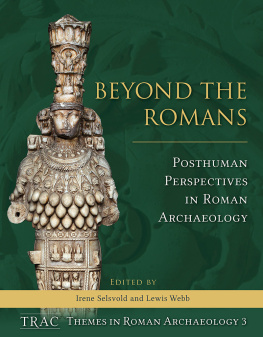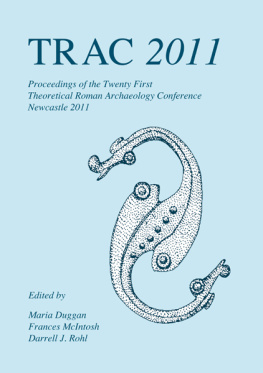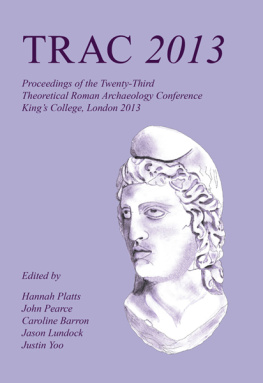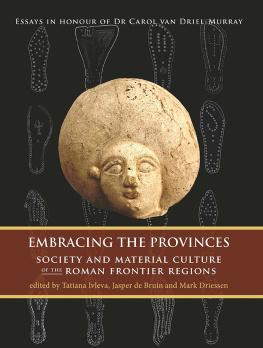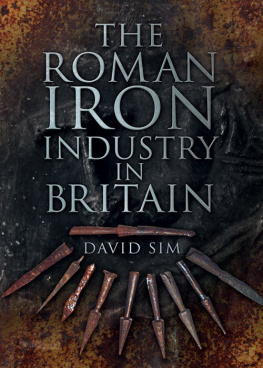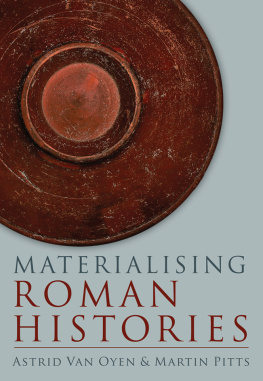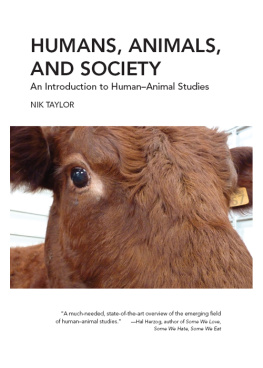Pagebreaks of the print version

BEYOND THE ROMANS
Posthuman Perspectives in Roman Archaeology
BEYOND THE ROMANS
POSTHUMAN PERSPECTIVES IN ROMAN ARCHAEOLOGY
Edited by
Irene Selsvold and Lewis Webb
TRAC THEMES IN ROMAN ARCHAEOLOGY VOLUME 3
Series Editor: Katherine A. Crawford
Published in the United Kingdom in 2020 by
OXBOW BOOKS
The Old Music Hall, 106108 Cowley Road, Oxford OX4 1JE
and in the United States by
OXBOW BOOKS
1950 Lawrence Road, Havertown, PA 19083
Oxbow Books and the individual authors 2020
Hardcover Edition: ISBN 978 1 78925 136 4
Digital Edition: ISBN 978 1 789251 371
Kindle Edition: ISBN 978 1 789251 388
A CIP record for this book is available from the British Library
Library of Congress Control Number: 2020931810
All rights reserved. No part of this book may be reproduced or transmitted in any form or by any means, electronic or mechanical including photocopying, recording or by any information storage and retrieval system, without permission from the publisher in writing.
F. Ferrando, Foreword: A Posthuman Call to Scholars, is licensed under the Creative Commons Attribution 3.0 Unported Licence. To view a copy of this license, visit http://creativecommons.org/licenses/ by/3.0/ or send a letter to Creative Commons, 444 Castro Street, Suite 900, Mountain View, California, 94041, USA.
For a complete list of Oxbow titles, please contact:
UNITED KINGDOM
Oxbow Books
Telephone (01865) 241249
Email:
www.oxbowbooks.com
UNITED STATES OF AMERICA
Oxbow Books
Telephone (610) 853-9131, Fax (610) 853-9146
Email:
www.casemateacademic.com/oxbow
Oxbow Books is part of the Casemate Group
Front cover: Foreground: The Great Artemis. Trajanic period. Now in the Ephesus Archaeological Museum (Seljuk). (Courtesy of the Austrian Archaeological Institute (AI). Photo credit: OeAW-OeAI/Niki Gail). Background: Marble pilaster with acanthus scrolls, Roman, first half of first century AD. Now in the Metropolitan Museum of Art. Accession number: 10.210.28ac (Public domain [CC0 1.0 Universal]).
Series Foreword
Katherine A. Crawford
The Theoretical Roman Archaeology Conference (TRAC) is pleased to present the third volume within the TRAC Themes in Roman Archaeology series. The present volume engages with new and emerging debates about posthumanism and its study within Roman archaeology. Throughout this volume, the authors approach the topic in innovative ways and strive to push boundaries. We hope that their contribution will lead to advances in how posthumanism is applied and studied within the field of Roman archaeology. TRAC continues to be committed to engaging with and furthering the dissemination of theoretically informed scholarship relating to Roman archaeology. A testament to this success is that this year marks TRACs 30th anniversary as an organisation. As the present chair of the TRAC Standing Committee, I am excited to reflect upon how we as an organisation have grown from what started out as a single conference and eventually evolved into an international organisation as well as considering the role that we will play in continuing to advocate for and influence the way theory is approached within the Roman archaeology community.
This series has sought to provide a venue for theoretically informed research themes, which has been successfully achieved in the first two volumes, of which the first volume covered different theoretical approaches as a way to understand barbarian interactions within the Roman Empires Northern frontiers, while the second volume considered the materiality and embodiment of Roman magic. The present volume represents the third volume in the TRAC Themes in Roman Archaeology series. This volume continues to demonstrate the ways in which theoretical topics are being engaged with and pushed within the Roman archaeology community. To this end, TRAC remains committed and passionate about evolving and developing with the ever-changing archaeological community. In particular, we as an organisation are focusing increased attention on the broader accessibility and dissemination of theoretically informed research through the venue of open access publications. Embracing this move, we launched the Theoretical Roman Archaeology Journal (TRAJ) in 2017, which is hosted by the Open Humanities Library. This journal will continue to leverage and act as a leading platform for the dissemination of theoretically informed debates and research within the field of Roman archaeology while complementing the research that has been produced within the three themed volumes of this series.
I am delighted to have acted as the series editor for this third volume and to see it to completion. Acknowledgements are owed to Thomas J. Derrick who oversaw the volumes inception. Further thanks go to the authors who willingly contributed to this volume and to the anonymous reviewers whose invaluable feedback has strengthened the presented research. Thanks are also owed to the team at Oxbow Books who have supported and ensured the successful release of this volume. Enormous gratitude is owed to Dr Sarah Scoppie (TRAC Standing Committee Treasurer) who provided tremendous support in helping me with the final copyediting. Finally, I would like to thank the volume editors Dr Lewis Webb and Dr Irene Selsvold without their perseverance and dedication you would not be reading this volume now.
University of British Columbia
24 November 2019
Foreword: A Posthuman Call to Scholars
Francesca Ferrando
Being a scholar offers a great opportunity: to be an agent of change. Knowledge-production is one of the technologies through which social constructions and political hierarchies are created and maintained. We, scholars, produce what is valued as scientific knowledge, which constitutes the basis for laws, civic norms and social evolutions; this is why we also bear great responsibility. A good scholar is someone honest with themselves and with the world around them. A good scholar is someone who is aware of their own point of view so that they are not forcing it onto others. A good scholar is someone who can see what is happening and is able to say: it does not have to be this way . Karl Marx said it clearly: the philosophers have only interpreted the world, in various ways; the point, however, is to change it (Marx and Engels 1976: 15; emphasis in original). As scholars, we can change the world, but first, we have to change ourselves, otherwise our own biases and bigotry will manifest in our writings and, without even realising it, we will be reinforcing injustice in static systems of power. In other words, if we just kept repeating the same prejudices that were developed and reinforced in previous eras, even if we were not aware of them, we still would not be rigorous scholars.
As scholars, we play a key role in social change. Society trusts us to produce scientific knowledge in order to advance not only general welfare, but also a fair system of regulations and ethics. Still, academic productions often reflect the biases of their era; thus, it is not surprising that great minds of the past could also be sexist and racist, such as the case of Aristotle, for instance, one of the fathers of Western philosophy, according to whom women were inferior and slavery was a natural condition. Scholarly productions that are still tainted with sexism, racism or ethno-centrism, among other discriminatory frames, are becoming less predominant (although still existing), thanks to the great work of intellectuals who dared to challenge mainstream views, and speak from perspectives that had been, until then, marginalised. As the black feminists Akasha (Gloria T.) Hull, Patricia Bell Scott, and Barbara Smith render it: all the women are white, all the blacks are men, but some of us are brave (Hull et al. 1982). Yes, we have to be brave to dare to change social and intellectual trajectories that are perceived as normal, by showing with academic rigour and scientific honesty what is missing.

